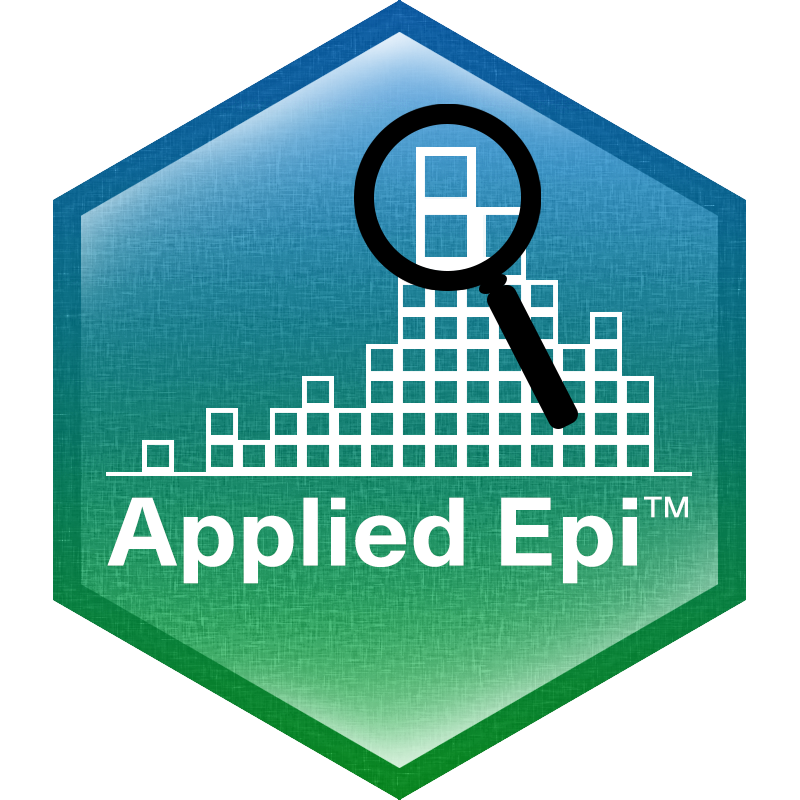About Us
We are applied epidemiologists with R expertise and extensive experience in outbreak response We are the home of The Epidemiologist R Handbook, used 3 million times by 850,000 people. We deliver practical R training courses to over 350 public health agencies worldwide. We host Applied Epi Community - a Q&A forum for R code and public health practice. We offer a global R Help Desk for timely troubleshooting and assistance.

R IS THE CATALYST FOR CHANGE
Free. Efficient. Cutting-edge. For a Haitian epidemiologist, using our free Epi R Handbook to transition routine analyses to R meant more flexibility, confidence, and time for systemic change.
‘With R I can do anything. What took 10 hours in Excel, I do in less than 1 hour. Also it is easier to detect if there is a mistake.’
Not just a new tool, but a new culture.In open-source software like R, users have the agency to be creators - to share localized solutions. Innovation is decentralised and career pathways are opened.
For Applied Epi, R is just the beginning. Adoption of R as the free common analytical language will facilitate higher-quality analyses, interoperability between agencies, reproducibility, overdue investment in ground-level personnel, and standardisation of scientific methods and training.
Read our case for ROur Services
A supportive ecosystem of materials, assistance, and community
The Epi R Handbook
The free R code reference manual for applied epidemiology
R Training
R training by technical experts who have practical experience
Timely Support
Q&A Forum and Help Desk assistance
Applied Epi Methods
Resources to elevate the quality of applied epidemiological science globally
Over 1500 epidemiologists at 350 agencies have loved our synchronous training courses
World Health Organization (WHO) offices in Ukraine, Uganda, Somalia, Philippines, Belize, & Eastern MediterraneanDoctors without Borders (MSF) operational centres Amsterdam (OCA), Belgium (OCB), Epicentre, & Barcelona (OCBA)NGOs and multi-national institutionsEuropean CDC, Africa CDC, TEPHINET, Task Force for Global Health, AFENET, UNICEF, Vital Strategies, Save the Children, Resolve to Save Lives, & CDC Foundation 90 National and local public health agencies and Field Epi Training Programs (FETPs) inUnited States (CDC), Canada (PHAC), Mexico, Ukraine, Nigeria, South Africa, DR Congo, Uganda, Algeria, Libya, Egypt, Zambia, Ethiopia, Ghana, Togo, Kenya, Rwanda, Tanzania, Liberia, Gambia, Namibia, Cambodia, Thailand, Malaysia, Philippines, Fiji, Indonesia, Taiwan, Australia, New Zealand, Lebanon, Saudi Arabia, Peru, Belize, Guatemala, Mexico, Kazakhstan, Tajikistan, Georgia, Kyrgyzstan, Uzbekistan, Pakistan, Turkey, Moldova, Finland, Serbia, Latvia, Luxembourg, Malta, Kosovo, Chechia, Albania, Slovenia, Norway, Sweden, Finland, Netherlands, Poland, Malta, Wales, Scotland, Ireland, Norway, Romania, Austria, Denmark (Statens Serum Institut), France (SPF), Belgium (Sciensano), Netherlands (RIVM), Germany (Robert Koch Institute), Bermuda, Cayman Islands, Dominican Republic, Saint Helena, British Virgin IslandsWithin North AmericaCalifornia DPH, New York DOH, Colorado DPHE, Arizona DOH, Oregon Health Authority, Kentucky DPH, Maryland DOH, Alaska DHSS, Hawaii DOH, Illinois DPH, Indiana DPH, Kansas DHE, Massachusetts DPH, Michigan DHHS, New Jersey DOH, Pennsylvania DOH, Tennessee DOH, Virginia DOH, Wisconsin DHS, District of Columbia (D.C.) DOH, US Virgin Islands DOH, Fraser Health (BC), New York City DOHMH (NY), Los Angeles County (CA), Alameda County (CA), San Diego County (CA), Sonoma County (CA), Santa Cruz County (CA), Riverside County (CA), Calaveras County (CA), San Mateo County (CA), Merced County (CA), Pasadena County (CA), Solano County (CA), Long Beach (CA), Trinity County (CA), Salt Lake County (UT), Maricopa County (AZ), Seattle & King County (WA), Spokane Regional Health District (WA), Southern Nevada Health District (NV), St. Louis County (MO), Madison & Dane County (WI), Quin County (MN), Travis County (TX), Tarrant County (TX), Washington County (OR), East Shore District (MD), El Dorado County (CO), Genesee County (MI), Grand Traverse County (MI), Ottawa County (MI), Ingham County (MI), Barry-Eaton District (MI), Jackson County (MI), Gratiot County (MI), Fairfax County (VA), Jefferson County (OR), Johnson County (KS), Mexico City Public Health Services (Mexico), Island Health (Vancouver Island), Indigenous Services Canada, Navajo Area Indian Health Service, Southern Plains Tribal Epi Center (SPTHB)Other local agenciesIncluding District Hospitals in Gisenyi, Nyanza, and Gihundwe (Rwanda), Kampala Capital City Authority (Uganda), Greater Accra (Ghana), Liberia counties of Lofa, Rivercess, and Nimba (Liberia), Ukrainian Oblasts of Kyiv, Zhytomyr, Khmelnytskyi, Odesa, Vinnytsia, Chernivtsi, Ivano-Frankivsk, Ternopil, Chernihiv (Ukraine), Northern Territories (Australia), Department of Health (Karakalpakstan, Uzbekistan), Andijan AIDS Center (Uzbekistan), Almaty City AIDS Center (Kazakhstan), Dushanbe City (Tajikistan), Osh (Kyrgyzstan), Batken (Kyrgyzstan), Sindh (Pakistan), Balochistan (Pakistan), Kala Azar MRC (Pakistan), Muzaffarpur (Pakistan), Bihar (Pakistan), Punjab (Pakistan), Rawalpindi (Pakistan), Lahore (Pakistan), Karachi (Pakistan), Faisalabad (Pakistan), Peshawar (Pakistan), Muzaffarabad (Pakistan), Hyderabad (Pakistan), Bais City (Philippines), Santa Marcela (Philippines), Metro Manila (Philippines) Bakan District (Pursat, Cambodia), Bantaeng Regency (Indonesia), Samarinda Health District (Indonesia), Yogyakarta City (Indonesia), Public Health Scotland (UK), Public Health Wales (UK), Ústecký kraj (Czechia), Bavaria (Germany), Stuttgart (Germany), Baden-Wuerttemberg (Germany), Hessian State (Germany), Bochum (Germany), Cuxhaven (Germany)Academic institutions including the University of Global Health Equity (UGHE, Rwanda), Emory University, University of Antwerp, Johns Hopkins University
Testimonials and course registrationStats and testimonials
We love to hear your stories!If you enjoy using the Epi R Handbook, tell us at [email protected], join our contact list, or tweet @epiRhandbook
-
0
Epi R Handbook page views -
0
Unique users -
0
Users in LMICs -
0
Countries/territories